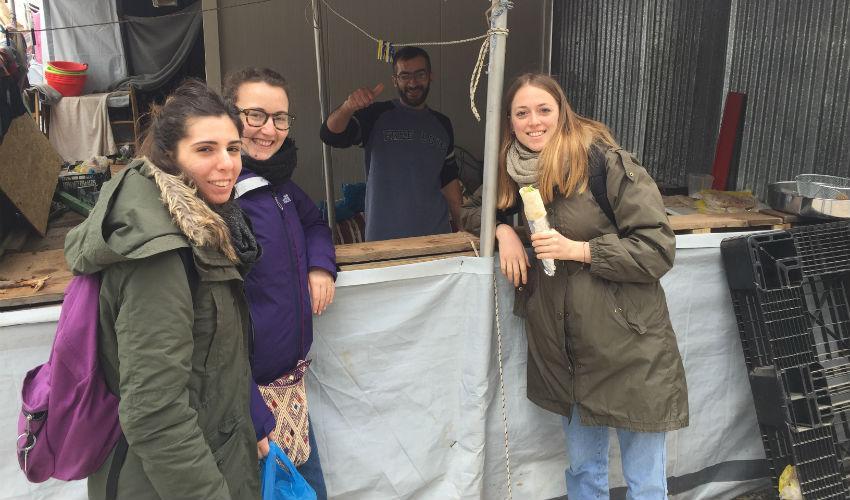
The Limbo of a Refugee Camp Lived by Three Students
GIULIA BUCCIONE, VIOLA CORRADINI AND BEATRICE MONTANO HAVE CONDUCTED A LEAP BOCCONI RESEARCH PROJECT IN THE GREEK CAMP OF RITSONA, WHICH HOSTS SYRIAN REFUGEES. THEY FOUND ORDINARY PEOPLE IN ENDLESS WAITING AND AN UNFORGIVABLE WASTE OF HUMAN CAPITALA suspended world, hundreds of blocked lives, an unforgivable waste of human capital. This is the refugee camp of Ritsona, Greece, as seen by Giulia Buccione, Viola Corradini and Beatrice Montano, three recent graduates in Economic and Social Sciences, who visited the camp in March 2017 and May 2018 for a research project of LEAP, the Bocconi Laboratory for Effective Anti-poverty Policies.
A Milanese architect specialized in emergency structures, Bonaventura Visconti di Modrone, asked Leap for an impact evaluation of the introduction of a public space, a tent for social activities, in the refugee camp that houses between 500 and 900 people, mostly Syrians.
But «how to evaluate the effectiveness of an intervention in a refugee camp, if we do not know how a refugee camp works?», the three students asked themselves, and soon realized the lack of scholarly literature on the subject. The first stay, in March 2017, allowed them to familiarize with the reality of the camp, «a low control prison, a place full of people stationed in a limbo for years», says Viola.
Ritsona is considered one of the safest camps in Greece and guests can come and go as they please, although the nearest village is a couple of hours away and the authorities ensure only one transfer a week to and from Athens and Chalkida. «We immediately observed the existence of an embryonic market economy, with many small activities, such as barbers, food retailers and so on, managed by the refugees themselves», Giulia recalls. «They also have to solve the problem of food supply with the €90 per month that the UNHCR provides to each head of household and €50 for each other member». The three girls then decided to use a questionnaire to investigate the economic and social choices of the refugees. In May 2018 they returned to Ritsona and collected the data that depict the situation before the installation of the new tent. Other students will collect the same data after the installation of the tent (which has been built right in these days).
Entire villages have moved from war-torn Syria and the refugee camps present a variegated microcosm (from the graduate to the farmer), which reproduces the problems and contradictions of the motherland, starting from the lack of integration between Syrians of Arab and Kurdish ethnicity.
«When you arrive in Ritsona you are impressed by small economic activities, which seem to indicate a strong dynamism», explains Beatrice, «but you immediately realize that they are undertaken by a small minority of young males. When you start to wander around the containers you discover a reality made of lack of social ties, especially for women who rarely come out of their containers, distrust, apathy, boredom, up to depression and episodes of severe psychological discomfort among young people.
«A first conclusion we came to», say the three girls, «is the lack of mutual information. Just as we had no idea of life in a refugee camp, they have no idea of what it is realistic to expect in Europe. They choose one country rather than another on the basis of a postcard or little more and expect salaries that a manager can earn».
Giulia, Viola and Beatrice have reached the deepest awareness of what it means to live in a refugee camp not so much through the answers to the questionnaire, but through meetings with youngsters of their age, who helped them in their research and with whom they could identify.
«Saleh is a 20-year-old boy of Palestinian origin», says Beatrice, «born in a refugee camp in Abu Dhabi and raised in several other camps until they were closed. After two and a half years in Greece, he is the only person we know who managed to get a passport as an asylum seeker and he showed it to us with some pride, but also with some bitterness, because the passport defined him as a stateless person».
«Firas is a Syrian boy with a degree in philosophy, which is one of my passions», says Giulia. «We’d talk about Avicenna, and I thought I could have been in his place, and instead I was interviewing him, knowing that I was going back home soon, while he had neither certainties for the future, nor the money to buy a pair of sports shoes».
«Michael and George, two Syrian Christian brothers, reminded me of the brothers of my best friend», Viola explains, «they spoke three languages, they were brilliant, but they had done nothing for the last two years. Interrupted paths, suspended lives».
Giulia, Viola and Beatrice are LEAP’s affiliated students. The program, which started in 2016, provides for regular meetings between students and professors who study development economics at Bocconi and for collaboration in research activities. From next summer, Beatrice will be a researcher at the London School of Economics, with Giulia and Viola leaving for a doctorate abroad.
by Fabio Todesco
